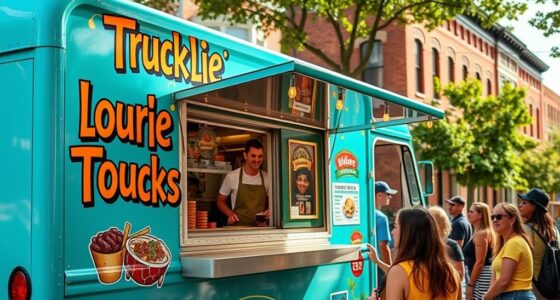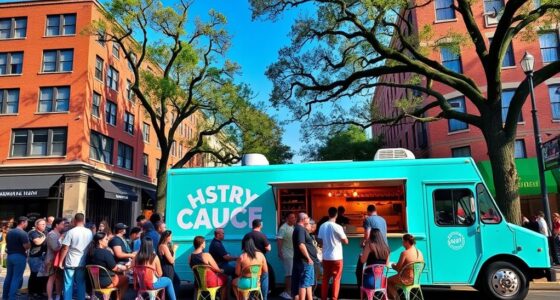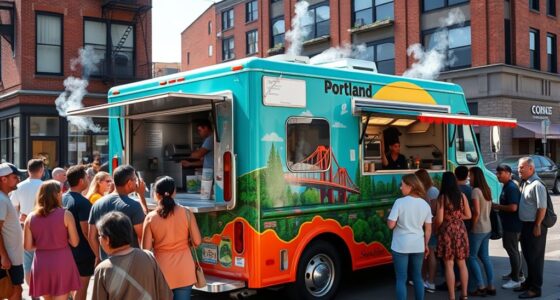Starting a food truck in Durham, NC, is a great way to tap into a vibrant, diverse food scene that values local ingredients and community engagement. You’ll need to navigate permits, licenses, and health regulations while choosing a reliable vehicle and designing an appealing menu with competitive pricing. Building relationships with local businesses and participating in community events will boost your visibility. Stay tuned to discover step-by-step tips to launch and grow your Durham food truck successfully.
Key Takeaways
- Obtain necessary permits, licenses, and health department approvals specific to Durham’s food truck regulations.
- Develop a menu focused on local ingredients, pricing strategically, and integrating mobile payment technology.
- Secure financing through local bank loans, grants, and acquire appropriate insurance coverage for liability protection.
- Select a reliable, compliant vehicle with appropriate modifications and equipment suited for Durham’s operational needs.
- Engage with community events, partner with local businesses, and join Durham’s business associations to build brand presence.
Local Durham Food Scene
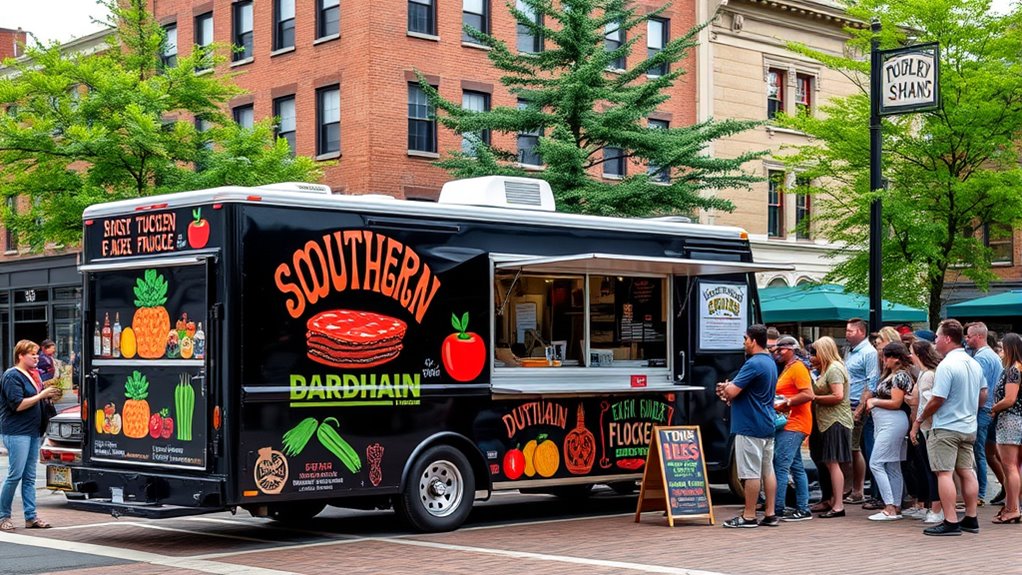
Durham’s food scene is vibrant and diverse, offering a rich mix of flavors that reflect its dynamic community. You’ll find Durham food trucks serving up local cuisine that highlights regional ingredients, giving you authentic tastes of the area. These trucks often gather at community events, creating lively hubs where locals and visitors connect over delicious meals. By exploring Durham’s food trucks, you get a firsthand experience of the city’s culinary diversity, from Southern classics to innovative fusion dishes. The emphasis on regional ingredients supports local farmers and artisans, making every bite meaningful. Whether you’re sampling at a festival or grabbing a quick lunch, the local Durham food scene invites you to enjoy fresh, community-driven flavors that showcase the city’s unique palate. Additionally, many food trucks incorporate sustainable practices and local food systems, enhancing the farm-to-table experience.
Understanding Local Requirements
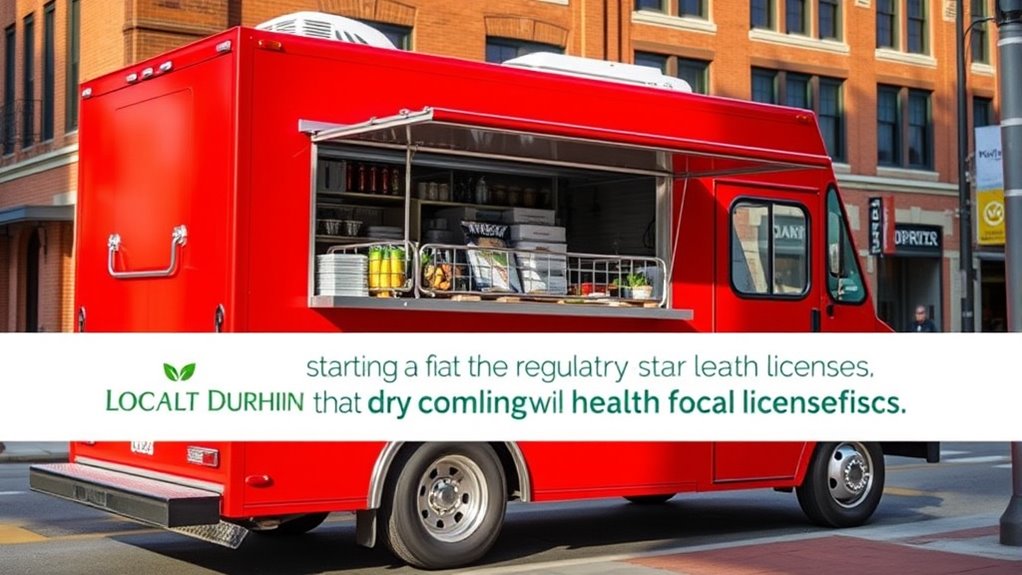
Before you set up your food truck in Durham, you need to understand the local requirements, including permits, licenses, and the application process. Make sure you’re familiar with sanitation standards and recordkeeping to stay compliant. Additionally, check out the designated food truck zones to find the best spots for your business. Embracing creative practice can also help you develop innovative ways to attract customers and stand out in a competitive market.
Permits, Licensing, Application Process
Are you ready to navigate the permit and licensing process for starting a food truck in Durham? Obtaining the necessary food truck permits and completing licensing applications are vital steps. You’ll need to understand Durham’s specific requirements, including local health, safety, and business regulations. The application process involves gathering documentation, such as proof of insurance and food handler permits, and submitting these to local authorities. Be prepared for inspections and possible fees. Staying organized and attentive to deadlines guarantees a smooth process.
Consider these key steps:
- Research Durham’s licensing requirements
- Complete and submit licensing applications
- Obtain necessary health and safety permits
- Schedule inspections with local officials
- Track application status and follow up as needed
Sanitation Standards and Recordkeeping
Maintaining proper sanitation standards is a key part of complying with Durham’s food truck regulations. You must follow strict guidelines to guarantee food safety for your customers. Regular cleaning of surfaces, utensils, and equipment is essential to prevent contamination. Durham requires that you keep detailed records of sanitation practices, including cleaning schedules and pest control measures. Proper record management helps demonstrate compliance during inspections. Additionally, storing food at appropriate temperatures and avoiding cross-contamination are critical for food safety. You should train your staff on sanitation procedures and document their training. Staying organized with accurate records not only meets local requirements but also supports maintaining high standards for food safety on your truck. Consistent sanitation and recordkeeping are crucial for your business’s success and reputation.
Designated Food Truck Zones
Understanding Durham’s designated food truck zones is essential for legally operating your business. These zones dictate where you can park and serve customers, impacting your food truck design and overall operations. To guarantee compliance, familiarize yourself with the city’s specific regulations, including zoning maps and approved locations. These zones promote safe and efficient street food commerce while encouraging menu innovation within designated areas.
Key considerations include:
- Restrictions on parking durations
- Requirements for health and safety inspections
- Limits on proximity to other food vendors
- Special permits for certain zones
- Accessibility standards for customers
Setting Up Your Base of Operations
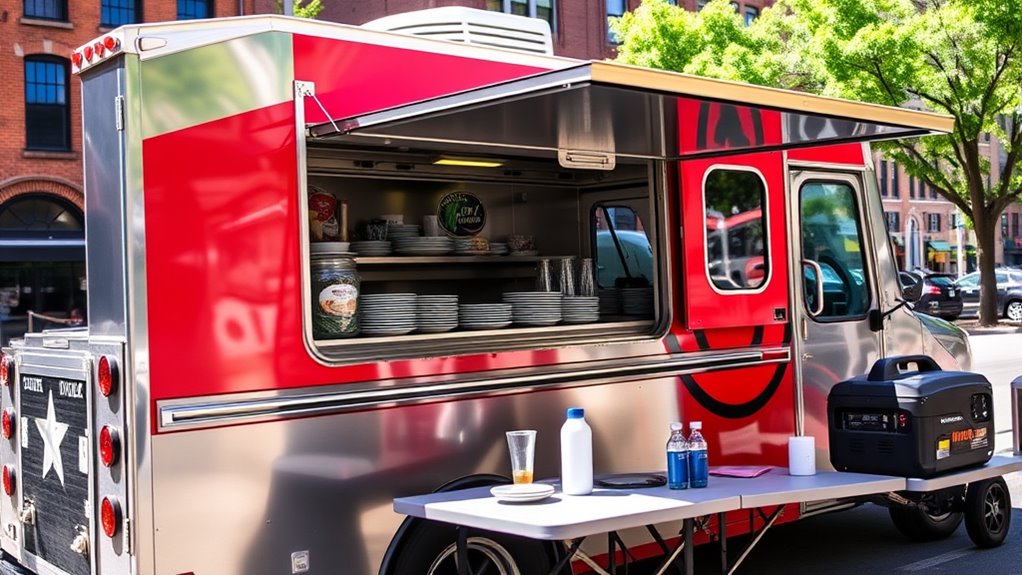
To establish your base of operations, you’ll need to take into account shared kitchen licensing requirements in Durham. Planning a custom kitchen layout helps you meet health codes and streamline your workflow. Making these decisions early ensures your food truck runs smoothly and stays compliant. Understanding trust issues with partners can also prevent future conflicts and ensure a cohesive operational environment.
Shared Kitchen Licensing Requirements
Setting up your food truck’s base of operations often involves obtaining a shared kitchen license, which guarantees your space meets health and safety standards. This license ensures compliance with food prep regulations, preventing violations that could delay your launch. To secure shared kitchen licensing, you must demonstrate your facility adheres to sanitation, storage, and equipment standards. Key considerations include:
- Proper food storage and temperature controls
- Sanitation protocols for surfaces and utensils
- Adequate ventilation and pest control
- Staff training in food safety procedures
- Regular inspections and documentation
Meeting these requirements not only secures your shared kitchen licensing but also builds trust with customers and health inspectors. Ensuring your shared space complies with all food prep regulations is essential for a smooth start in Durham’s competitive food scene.
Custom Kitchen Layout Planning
Designing a custom kitchen layout tailored to your food truck’s operations can substantially boost efficiency and safety. Focus on layout optimization by carefully arranging your kitchen equipment to minimize movement and streamline workflow. Choose compact, multi-purpose kitchen equipment that fits your menu and space constraints. Place the prep area near cooking stations and ensure easy access to refrigeration and storage. Consider safety by creating clear pathways and keeping hot surfaces separate from cold storage. Properly planning your layout helps reduce clutter, improves sanitation, and speeds up service. Take the time to map out your design, considering how each piece of equipment interacts within your limited space. A well-thought-out kitchen layout not only enhances daily operations but also supports long-term success in Durham’s competitive food scene.
Budgeting and Financing Your Food Truck

To get your food truck on the road, you need to consider the initial costs of purchasing your vehicle and how to finance them. Local bank loan programs can help you secure the funds you need, but don’t forget to budget for liability coverage to protect your business. Understanding these financial aspects early will set a solid foundation for your venture. Developing a clear financial plan and setting career and professional development goals can also enhance your ability to manage costs effectively.
Initial Vehicle Purchase Costs
Purchasing your food truck is a significant upfront investment, and understanding the initial vehicle costs is essential for effective budgeting. Your vehicle selection directly impacts purchase costs and long-term profitability. Factors influencing costs include the truck’s size, condition, and customization needs. Consider whether you’re buying a new or used vehicle, as this affects price points and features. Additionally, options like retrofitting or brand-specific modifications can increase expenses. Keep in mind that higher-quality vehicles tend to have higher purchase costs but may save money on repairs later. To ensure you’re making an informed decision, evaluate multiple options and consider the total costs involved.
- Vehicle size and configuration
- Condition: new vs. used
- Customization and equipment installation
- Brand reputation and features
- Additional fees and taxes
Local Bank Loan Programs
Securing the right financing options can make a significant difference in managing your food truck expenses. Local bank loan programs often provide accessible funding through competitive interest rates and structured repayment plans. To increase your chances, prepare a solid loan application highlighting your business plan and financial stability. Some banks also offer grants or special programs for small businesses, which could reduce your initial costs. When exploring options, compare terms carefully to find the best fit for your needs.
| Bank Grants & Loan Application | Benefits |
|---|---|
| Bank grants | No repayment, boosts startup capital |
| Loan application | Flexible financing, manageable payments |
Liability Coverage for Food Trucks
Having the right liability coverage is essential to protect your food truck business from unforeseen costs and legal claims. Liability insurance helps cover expenses if someone is injured or if there’s property damage during your operations. When selecting coverage, pay close attention to coverage limits to ensure they match your specific needs. Proper coverage minimizes financial risks and keeps your business running smoothly. Consider these key points:
- Assess potential risks unique to your food truck
- Choose adequate coverage limits to prevent gaps
- Understand what liabilities your policy covers
- Maintain documentation of your insurance policy
- Regularly review and update your liability coverage as your business grows
Designing Your Menu and Pricing Strategy
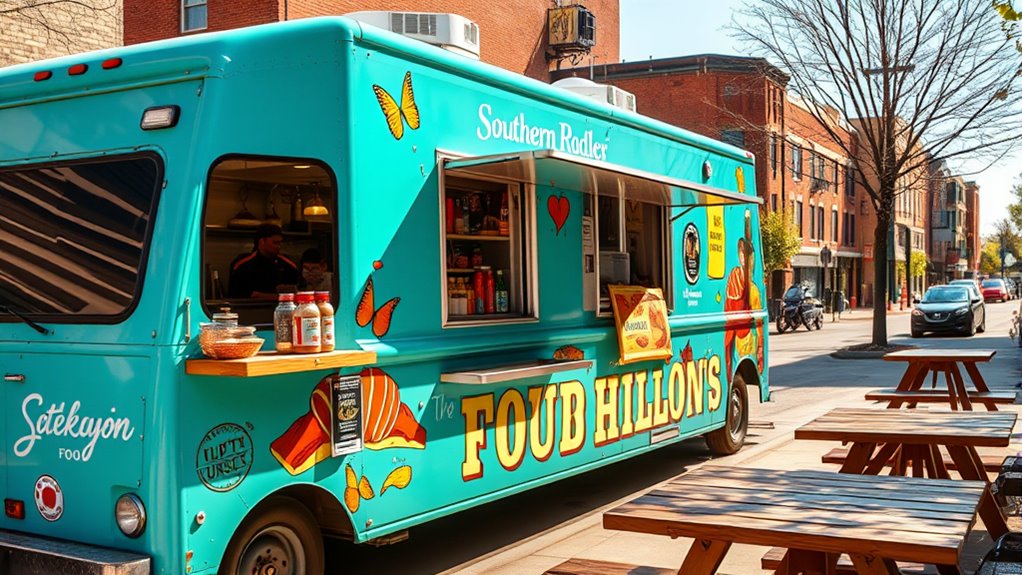
When designing your menu, focus on sourcing innovative local ingredients to stand out and appeal to Durham’s community. Keep costs in check by using menu engineering techniques to balance popular items with profitable ones. By carefully crafting your offerings and pricing, you’ll attract customers while maintaining healthy margins. Incorporating cost-effective strategies such as portion control and menu analysis can further enhance your profitability.
Innovative Local Ingredient Sourcing
Innovative local ingredient sourcing can transform your menu and pricing strategy by offering fresh, unique flavors that set your food truck apart. By prioritizing sustainable sourcing and seasonal ingredients, you can create dishes that appeal to health-conscious and environmentally aware customers. This approach not only enhances taste but also boosts your reputation as a community-focused chef. To maximize impact, consider these strategies:
- Partnering with local farmers for fresh produce
- Incorporating seasonal ingredients into daily specials
- Highlighting the story behind your ingredients on menus
- Using sustainable packaging to reinforce your commitment
- Adjusting menu prices based on ingredient availability and quality
This focus on local, seasonal sourcing helps you craft a dynamic menu that resonates with Durham’s vibrant, eco-conscious food scene.
Cost Control and Menu Engineering
Effective cost control and menu engineering are essential to your food truck’s profitability and long-term success. You need to carefully consider ingredient sourcing to keep costs low without sacrificing quality. Select versatile ingredients that can be used in multiple dishes, reducing waste and streamlining inventory. When designing your menu, focus on items with high profit margins and popular appeal. Pricing strategies should reflect ingredient costs, preparation time, and local market rates. Use portion control to prevent overspending on ingredients and ensure consistency. Regularly analyze sales data to identify best-sellers and adjust your menu accordingly. By balancing ingredient sourcing with smart pricing strategies, you’ll maximize profits, minimize waste, and create a menu that attracts and retains loyal customers.
Technology and Operations

Using wireless card readers can speed up your sales and reduce cash handling. A mobile POS system helps you manage orders and payments on the go, keeping operations running smoothly. Stock tracking tools let you monitor inventory in real time, so you never run out of essentials.
Wireless Card Readers for Vendors
Wireless card readers have become essential tools for vendors at food trucks in Durham, streamlining the payment process and reducing wait times. These devices enable quick, secure cashless transactions, improving customer satisfaction and operational efficiency. With wireless card readers, you can accept payments anywhere, eliminating the need for bulky terminals or manual cash handling. They also support multiple payment methods, including contactless options like Apple Pay and Google Pay. Investing in reliable wireless card readers guarantees smooth transactions during busy hours and helps you stay competitive. Additionally, features like real-time transaction tracking and integrated software can enhance your business management. Overall, these tools simplify your payment system, freeing you to focus on delivering great food and service.
- Easy setup and integration with existing POS systems
- Enhanced security features for cardholder data
- Compatibility with various mobile devices and platforms
- Ability to process multiple payment types quickly
- Real-time transaction reporting and analytics
Mobile POS and Stock Tracking
Mobile POS systems and stock tracking tools have revolutionized how food truck vendors manage their operations on the go. With mobile payments, you can accept credit cards, digital wallets, and contactless transactions instantly, speeding up service and reducing errors. Integrated inventory management features help you keep real-time track of ingredients and supplies, preventing stockouts or overstocking. These systems streamline order processing, allowing you to ring up sales quickly while automatically updating inventory levels. Plus, many solutions offer detailed sales reports, helping you analyze popular items and adjust your menu accordingly. Using mobile POS and stock tracking tools ensures smoother daily operations, improves customer experience, and helps you make smarter business decisions—all from your smartphone or tablet.
Marketing and Growing Your Presence
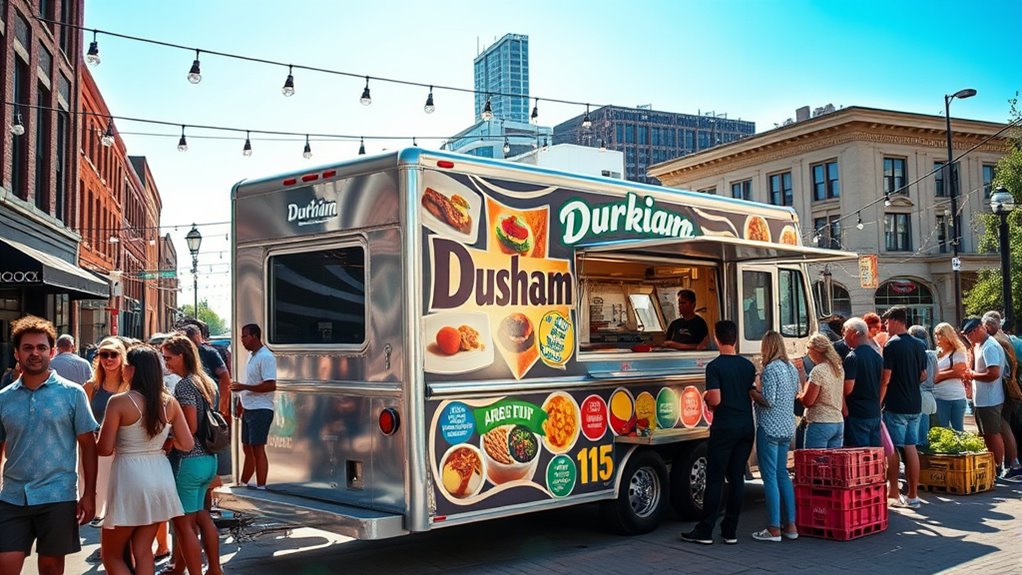
To boost your food truck’s visibility, focus on peak hours and seasonal events when foot traffic is highest. Engaging with local community events can also help you build a loyal customer base and increase sales. By aligning your marketing efforts with these opportunities, you’ll grow your presence effectively in Durham.
Peak Hours and Seasonal Events
Ever wondered when your food truck can attract the most customers? Peak hours are vital for maximizing sales, so plan accordingly. During lunch and dinner times, focus on peak hour strategies like quick service and efficient staffing. Keep seasonal menu changes in mind; offering special items during busy periods can boost interest. Additionally, align promotions with local seasonal events to draw larger crowds. Timing your presence around key events or festivals enhances visibility and sales. Remember, understanding the rhythm of Durham’s busy times helps you adapt your offerings and staffing. By combining peak hour strategies with seasonal adjustments, you position yourself for steady growth and increased customer loyalty. Staying adaptable and aware of seasonal trends ensures your food truck thrives year-round.
Engaging Local Community Events
Engaging with local community events offers a powerful way to boost your food truck’s visibility and build a loyal customer base. Participating in events or sponsoring community activities shows your commitment to the area, fostering community engagement. This not only attracts new customers but also strengthens relationships with locals. Consider partnering with event organizers for sponsorships, which can include branding opportunities and exclusive access to event attendees.
| Benefit | Strategy |
|---|---|
| Increased visibility | Sponsor local festivals or markets |
| Customer loyalty | Attend community fundraisers and events |
| Brand recognition | Offer promotions during local gatherings |
| Community support | Engage directly with residents and organizations |
Local Partnerships and Networking

Building strong local partnerships is essential for a food truck’s success in Durham, as it opens doors to new customers and collaborative opportunities. Connecting with nearby businesses, farmers markets, and community organizations amplifies your food truck branding efforts and boosts visibility. Through strategic networking, you can secure event gigs, participate in local festivals, and develop mutually beneficial relationships. Effective social media outreach helps to showcase these partnerships, attracting a broader audience and fostering loyalty. Consider engaging with:
- Local business associations
- Durham-based food festivals
- Community service groups
- Collaborations with local breweries
- Influencer partnerships in Durham
These connections create a supportive ecosystem that enhances your reputation and drives sustained growth in Durham’s vibrant food scene.
Frequently Asked Questions
What Permits Are Required Specifically for Food Trucks in Durham?
You need to obtain food truck permits and meet Durham licensing requirements before operating. First, apply for a mobile food vendor permit from the Durham County Health Department. You’ll also need a business license from the Durham City Clerk’s Office and a North Carolina sales tax permit. Make certain your truck passes health inspections and adheres to local zoning laws. Staying compliant with these permits keeps your food truck legal and ready to serve.
How Do Durham’s Weather Conditions Affect Food Truck Operations?
As the weather in Durham paints a dynamic canvas, you must adapt like a chameleon to its seasonal shifts. Extreme heat, rain, or cold can impact your food truck operations, making weather safety vital. You should plan seasonal menu adjustments to cater to customer preferences and weather conditions, ensuring comfort and safety. Staying flexible and prepared for sudden changes will help keep your business thriving regardless of Durham’s ever-changing climate.
Are There Any Durham-Specific Food Truck Festivals or Events?
Yes, Durham hosts several local food truck meetups and community food festivals you can join. Events like Durham Food Truck Rodeo and the Durham Food Festival offer great opportunities to showcase your truck and connect with customers. Keep an eye on local event calendars and social media pages for updates. Participating in these gatherings can boost your visibility and help you build a strong presence in the Durham food scene.
What Are the Most Popular Food Truck Cuisines in Durham?
In Durham, you’ll find popular food truck cuisines like Southern comfort, tacos, BBQ, and Asian fusion. To stand out, focus on strong food truck branding and an eye-catching mobile kitchen design that reflects your cuisine’s personality. These elements help attract customers and create memorable experiences. By combining delicious food with creative branding, you’ll boost your chances of success and build a loyal local following in this vibrant food scene.
How Can I Find Available Parking Spots for My Food Truck in Durham?
To find available parking spots for your food truck in Durham, NC, start by researching parking regulations to guarantee compliance. Use parking apps like ParkMobile or SpotHero to locate open spaces in real-time. Check city websites and local forums for designated food truck zones. Network with other vendors for insider tips. By combining these tools and information, you’ll efficiently discover spots that keep your business running smoothly and legally.
Conclusion
Starting a food truck in Durham offers exciting opportunities, but success depends on more than just great food. As you navigate permits, find your perfect location, and build your brand, remember—each step reveals new challenges and chances. Will your menu stand out enough? Can your marketing reach the right crowd? The journey has only begun, and the real adventure lies ahead. Stay prepared, adapt, and keep pushing forward—because in Durham’s vibrant scene, your food truck could be the next big thing.



